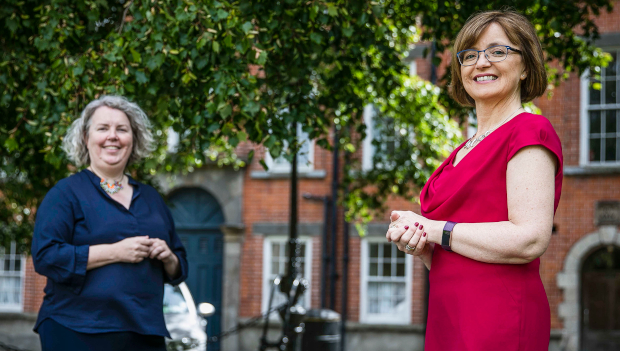
Trinity, Microsoft join forces to accelerate next-generation quantum technologies
Trinity College Dublin and Microsoft Ireland announced details of a new collaboration focused on accelerating advancements in next-generation quantum technologies and attracting and training future world-leaders in the field. The collaboration will further strengthen Ireland’s position as a key player in quantum research globally.
Microsoft will provide significant funding to support PhD students working on cutting-edge quantum research at Trinity and the establishment of a female scholarship programme for Trinity’s MSc in Quantum Science and Technology, which will start in September 2021. The programme will place a unique emphasis on direct engagement with wider industry via Trinity’s MSc internship programme.
The collaboration, which comes after the announcement of Microsoft’s Azure Quantum (the world’s first full-stack, open-cloud quantum computing ecosystem), will support quantum research teams in Trinity’s School of Physics and foster interactions with some of the leading research teams in the private sector to further ignite activity in the field in Ireland.
The collaboration is spearheaded by Trinity professors John Goold and Stefano Sanvito. Prof Goold, who will direct the new MSc in Quantum Science and Technology course, said: “We are thrilled to team up with Microsoft to pursue exciting research in a field of increasing scientific and societal significance. Having emerged from fundamental science over the last two decades, quantum research is now blossoming and promises to revolutionise technology in the coming years with discoveries and innovations that promise to power a more sustainable, advanced future.
“We are also delighted that Microsoft is supporting a female-only scholarship programme for the new MSc in Quantum Science and Technology. As diversity has grown in my research team at Trinity, we have been more creative in pursuing and delivering high-quality science. Female uptake in certain STEM subjects remains low but initiatives like this are helping to drive positive change.”
“Quantum computing presents unprecedented possibilities to solve society’s most complex challenges and help to secure a sustainable future,” said Cathriona Hallahan, managing director, Microsoft Ireland. “At Microsoft, we’re committed to responsibly turning these possibilities into reality for the betterment of humanity and the planet.
“That is why we are so excited to team up with the team at Trinity to put a focus on advancing research in this area and help to position Ireland as a leader in quantum technologies. The introduction of the female scholarship programme is a welcome one and I believe more focused mechanisms such as this will help us to attract more females not only into the area of next-generation quantum technologies but also wider STEM related industries. Applications for this scholarship are open and I’d encourage anyone with the right skills and interest to apply, it’s an amazing opportunity.”
“Quantum computers can solve, in seconds, problems that would take today’s fastest computers thousands of years to solve,” said Kieran McCorry, national technology officer, Microsoft Ireland. “As such, it brings within reach the opportunity to address climate change and drive significant pharmaceutical advancements, amongst other things. The collaboration between Trinity College Dublin and Microsoft Ireland ensures greater support for the next generation of researchers in the emerging area of Quantum computing by enhancing students’ capabilities in computational thinking and cloud-based research models. Additionally, it will enable us to lead the way in advancing next generation technology.”
Prof Stefano Sanvito from Trinity College Dublin, added: “Technologies are being miniaturised at such a rate that quantum effects, synonymous with the microscopic world, are firmly in the spotlight. For example, entanglement is being exploited to offer faster, higher performance in certain computational tasks. Our burgeoning field of quantum technologies aims to exploit such effects for technological gain and research partnerships between leading universities and industry partners like this one are key in driving things forward – we very much look forward to working with Microsoft in this area.”
TechCentral Reporters








Subscribers 0
Fans 0
Followers 0
Followers